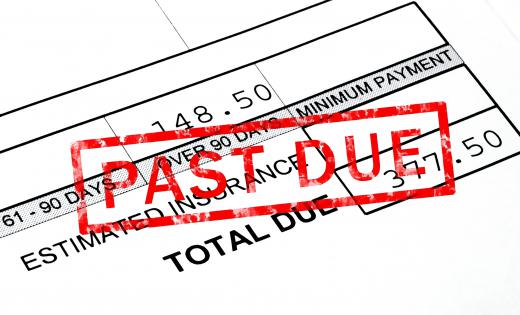At WiseGEEK, we're committed to delivering accurate, trustworthy information. Our expert-authored content is rigorously fact-checked and sourced from credible authorities. Discover how we uphold the highest standards in providing you with reliable knowledge.
What is a Charge off?
Charge offs are credits that were previously carried as receivables on accounting records, but are now considered uncollectable for some reason. The purpose of the charge off is to allow a controlled procedure to take place that will exclude the inclusion of the uncollected credit when calculating the current balance in Accounts Receivable. Thus, a charge off is a simple write off that removes an item from the anticipated net income.
The charge off does not mean that there will be no further attempt to collect the outstanding debt from the debtor. Rather, the use of a charge off simply means that the amount of the debt will no longer be reflected in the Accounts Receivable for the purpose of determining how much income remains to be collected from outstanding invoices issued to customers. Any invoice that is charged or written off the main section of the Receivables will still remain in the overall financial records of the company. Usually, the written off amount is referred to as bad debt.

Many companies have a policy of using the charge off to identify outstanding invoices that remain unpaid long after the payment is past due. In an order to avoid using a charge off, companies may choose to send reminders periodically for up to 120 days after the due date of the invoice. After that point, the invoice may be charged off, removing it from the Accounts Receivable, and turned over to a collection agency for further action.
In the event that the collection agency is able to secure payment on a delinquent invoice, the company will often create an amended invoice or other instrument to allow for the reception of the value of the original invoice, minus any fees charged by the collection agency. The original charge off is normally not reversed, although a few companies do prefer to follow that procedure and simply amend the balance due to match the amount collected and forwarded by the collection agency.
The charge off is a helpful way to remove an uncollectable debt from the accounting records of a corporation. This approach helps to keep the current Accounts Receivable figure up to date, and provides the business owner with realistic figures about what income can be reasonable anticipated over the next one to three months.
AS FEATURED ON:
AS FEATURED ON:











Discussion Comments
@anon294771: Try looking it up in the Fair Debt Collection Practices Act. If it's a federal law, my guess is it's in that act.
To think when a company "writes off" a bad debt, ultimately the tax payers are picking up the loss. Companies should not be allowed to collect on a debt once it is written off....this looks like double dipping. They should not be able to seel charge off accounts. It invites all kinds of scam and unscrupulous people to haunt innocent and folks who are experiencing hard times. I have seen some writings on some web sites that indicate collection is prohibited after charge off, but it seems, no one can provide me with that Federal Law.
If you are the owner of any charge off accounts that are in collections, you should keep a few things in mind. First and foremost, most collection agencies will not be expecting to get paid the whole thing. So if you can get some money together and try to settle your debt for way less than you owe, you might not have to pay the whole thing. It will still affect your credit though.
Second of all, if you do manage to settle the debt for less than you owe, anything you save over (I believe) $600 will be reported to the IRS and count as income. So you will have to pay taxes on it.
@Azuza - Ah yes, collections people love to talk to you about "your credit" and how whatever it is you're doing is going to mess it up. I'm not surprised they told you a charge off debt looks bad on a credit report. (I mean, it does, but so do a lot of other things.)
Honestly I've never thought about a charge off from the perspective of the company, only as a consumer. I suppose it doesn't make much sense for a company to keep an account as a receivable when there is is little hope of it being paid in the near future. I feel like this would pain an inaccurate picture of their financial situation.
The only time I've ever dealt with a charge off was a credit card charge off. A few years ago I was in a pretty bad financial situation, so I simply stopped paying my credit cards. I had called them and tried to get them to lower my interest rate or help me in some other way, but no one was willing to work with me.
Anyway, this resulted my credit card accounts going to collections. I remember one gentleman from one of the companies called me to let me know my card was about to be a "charge off" and this apparently looks really bad on your credit. At that point I couldn't pay, so I was like "Okay." At that point there was really nothing I could do.
I am a debt collector at a law firm and this information about chargeoffs is helpful in case I get debtors asking what do you mean when you say my card 'charged off?'
Post your comments